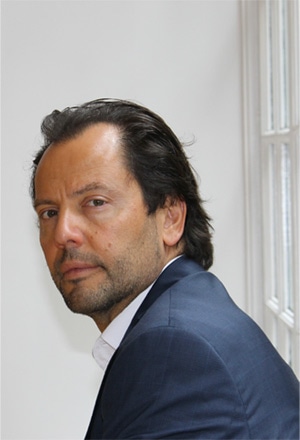POPULIST REVOLT
By Vanessa Drucker
Global Finance held its monthly Salon in the magazine’s New York office with Luigi Zingales, professor of entrepreneurship and finance at the Booth School of Business of the University of Chicago and author of A Capitalism for the People—Recapturing the Lost Genius of American Prosperity.
 |
| Photo Credit : KATE FREY |
Global Finance: What prompted you to write your recent book, in which you explore corporate cronyism?
Luigi Zingales: My unease had been building since the late-1990s, as I watched the United States degenerating into a state closer to my native Italy—not in embracing the positive aspects, like the food and wine, but in embracing crony capitalism. For a long time, the US had found a successful middle ground between democracy and meritocracy, and by producing wealth for most of its citizens had generated a broad consensus and belief in the fairness of its competitive marketplace. Lately, however, restrictions to competition are increasing, along with a sense of injustice and populist resentment.
GF: What brings about those anticompetitive forces?
Zingales: Traditionally, corporations used to lobby to get the government off their backs. As they grew more skillful, their efforts went from reactive to proactive, and toward getting government in their pockets to obtain unique privileges. An inevitable surge in populism eventually generated attacks on wealth and calls for redistribution, such as punitive taxes on bankers’ bonuses. Yet ironically, in 2009 the Obama administration was simultaneously creating a public/private partnership scheme [the PPIP] that was highly favorable to private investors. The end result was a vicious cycle, whereby legitimate entrepreneurs often vanished and corrupt players lobbied hard and succeeded in building their political clout.
GF: How can we interrupt and fix that vicious cycle?
Zingales: For one thing, regulation needs to be simple and limited. That’s why I support a return to Glass-Steagall [the Banking Act of 1933], the Depression-era legislation that separated commercial and investment banking activities. It may be economically inefficient to do so, but what is the next-best-feasible alternative?
GF: What are some solutions?
Zingales: We might consider a progressive tax on lobbying, to counteract distortions. Or we could enlarge the notion of antitrust. Today’s commissions perform cost/benefit analyses as they study the trade-offs derived from mergers, but they neglect the concept that merged entities become more powerful politically.
GF: But can that theme translate into a global arena?
Zingales: It’s true that countries seek national corporate champions to fight on the global stage, while ignoring monopoly effects. Realistically, it’s hard to limit that without global regulation, and much easier for a few corporations to coordinate on a global level than for regulators to harmonize.
GF: You serve on the board of Telecom Italia. How is your experience there instructive?
Zingales: I was actually invited on the board as a last-minute substitute. But I accepted because I perceived a new order in the world, and I welcomed an opportunity to shape it. Boards need a joker figure, someone who can speak out without fear of getting beheaded.
GF: Are you a jester? A libertarian? A free marketeer who still supports regulation?
Zingales: My platform cuts across the traditional ideological spectrum, which is both a frustration and an excitement. I don’t fit into a box. Most people who refuse to follow a path of logic are protecting their own ideological or vested interests. I try to maintain a logical intellectual rigor.



